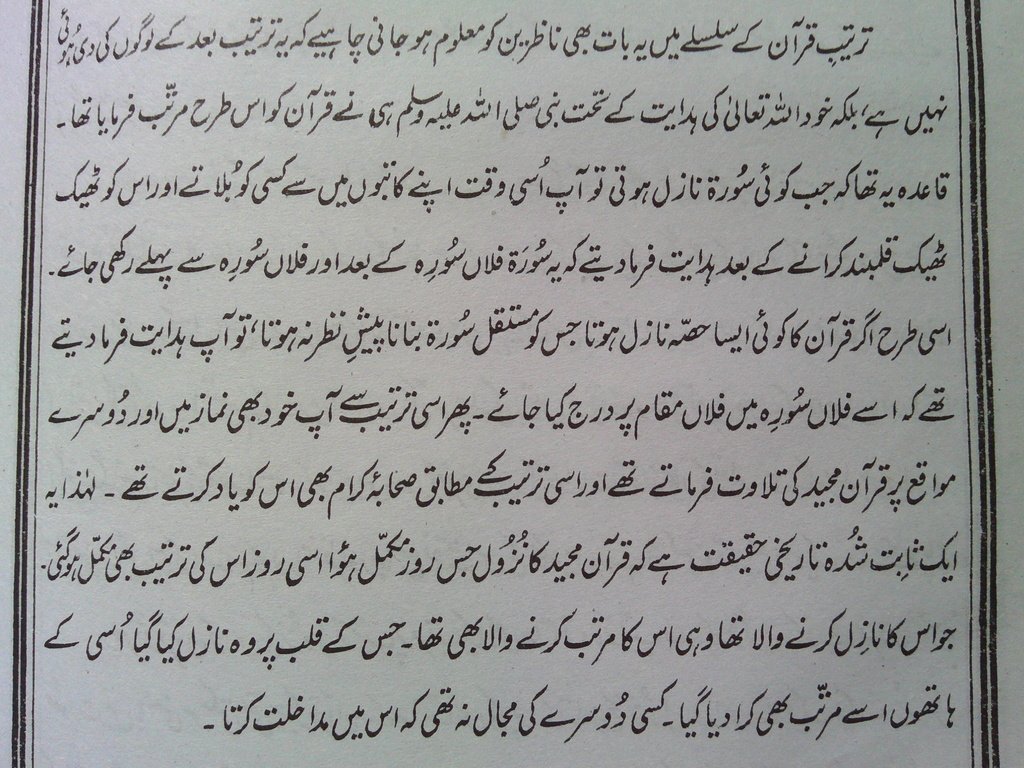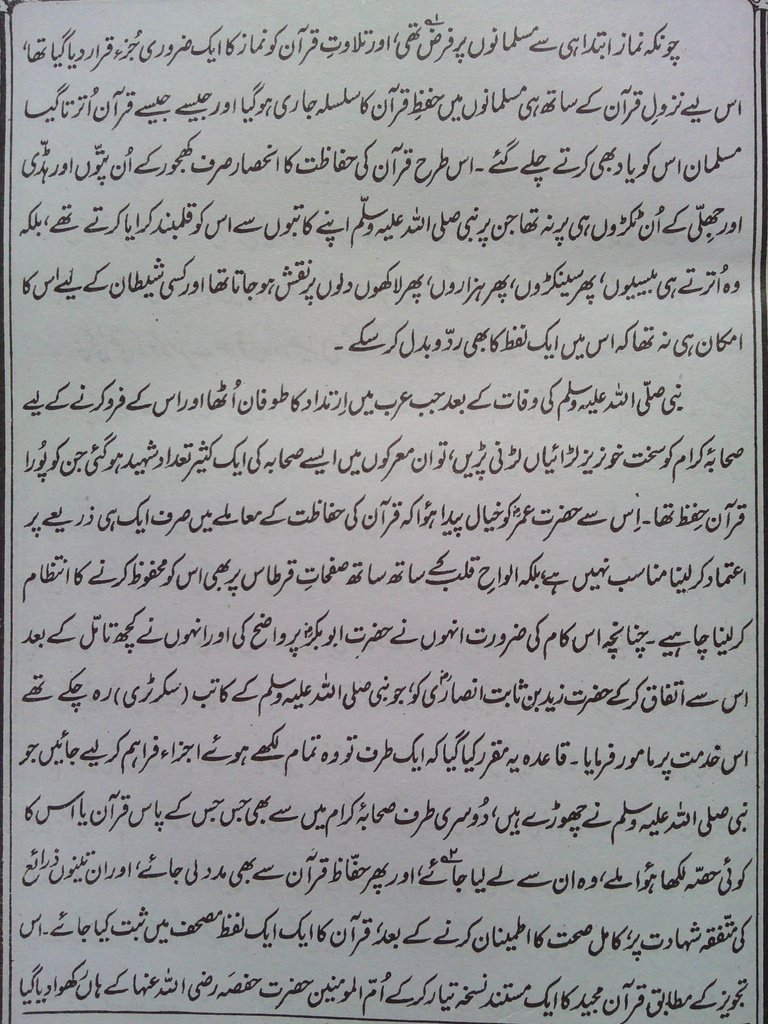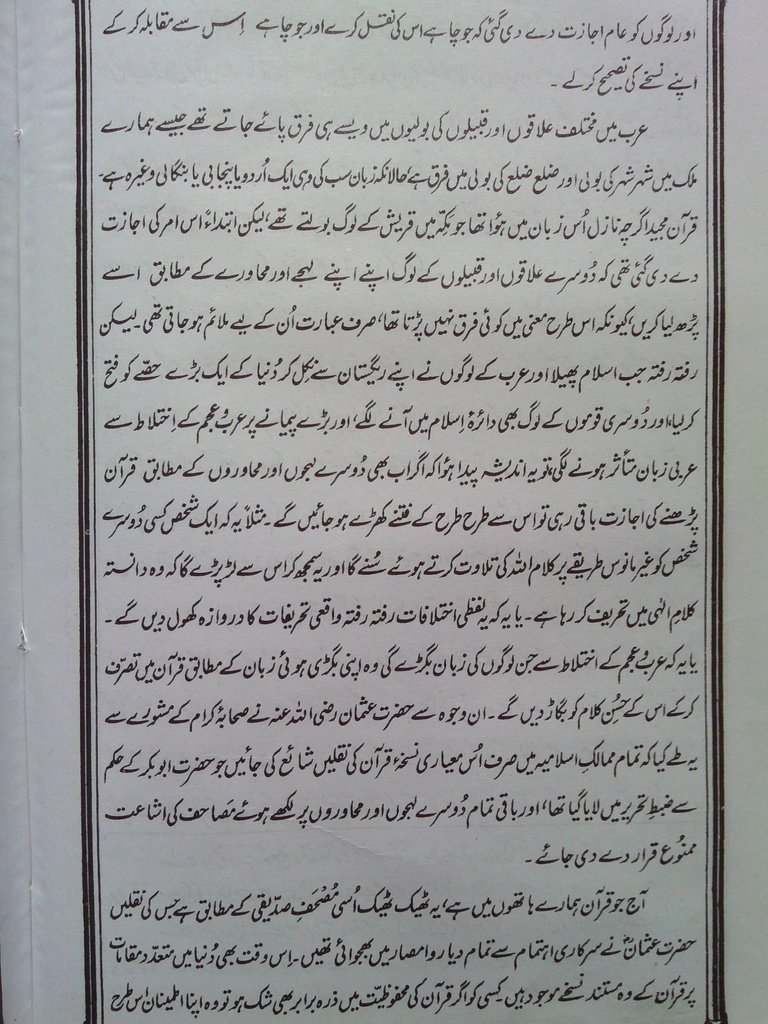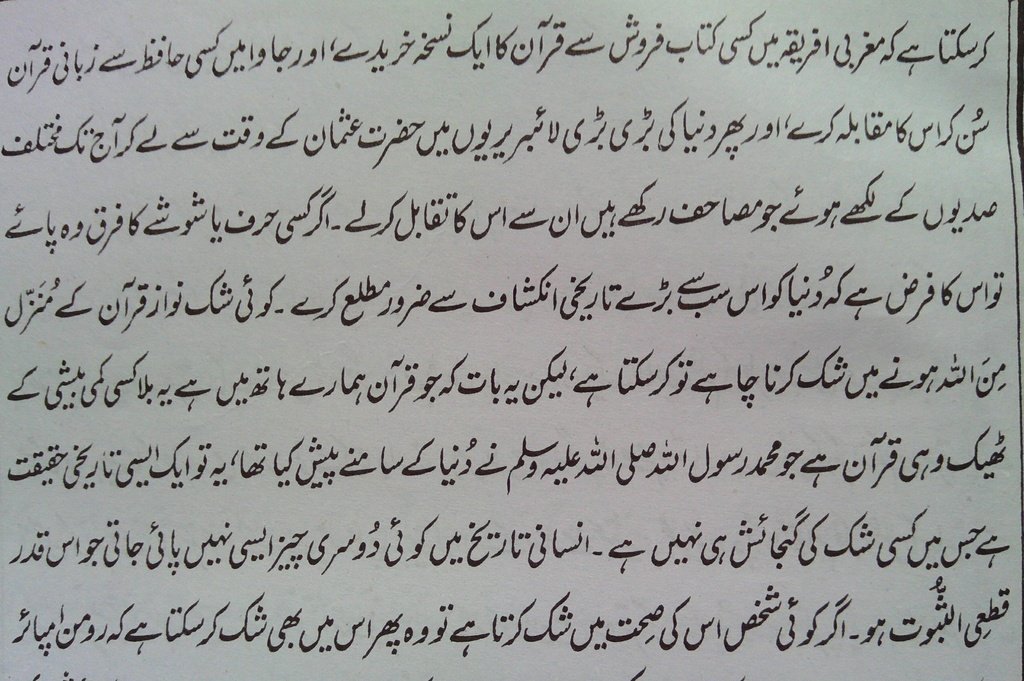
Sister, may I ask what your source is for this?
I did a brief course years ago, with reliable teachers and sources, and dug up an essay I had written on the collection of the Qur'aan, and this is the relevant part:
This does not imply that the Qur'an was not fully preserved, indeed the fact that it could be written and verses put in the correct order right up to the last verse revealed shortly before the death of the Prophet

, show that it was part of the preservation.
This is also mentioned in the following sources:
Usool at Tafseer: The methodology of Qur'aanic explanation, by Dr Abu Ameenah Bilal Philips, Dar al Fatah, 1997, Sharjah, UAE
An Introduction to Understanding the Qur’an, by Sayyid Abul A’la Maududi. Translated by Zafar Ishaque Ansari. Delhi: Markazi Maktaba Islami Publishers 1997.
An Introduction to the Qur’an, by Suhaib Hasan. London: Al-Quran Society 2000
Sheikh Saalih al Munajjid at islamqa.com
https://islamqa.info/en/10012
Dear Sister,

I have taken the following from "Ahmad Von Denffer Ulum al-Quraan".
The Qur'an written during the Prophet's Lifetime
There is no doubt that the Qur'an was not only transmitted orally by many Muslims who had learned parts or the whole of
it, but that it was also written down during the lifetime of the Prophet.
The well-known report about 'Umar's conversion shows that large passages of the revelation had already been written down even at a very early time, in Makka, long before the hijra, when the Prophet was still in the house of Arqam.
'
Umar had set out to kill the Prophet Muhammad, when somebody informed him that Islam had already
spread into his own family and pointed out to him that his brother-in-law, his nephew and his sister had
all become Muslims. 'Umar went to the house of his sister and found her together with her husband and
another Muslim. A dispute arose and 'Umar violently attacked both his brother-in-law and his own sister.
'When he did that they said to him "Yes, we are Muslims and we believe in God and His apostle and you
can do what you like". When 'Umar saw the blood on his sister, he was sorry for what he had done and
turned back and said to his sister, 'Give me this sheet which I heard you reading just now so that I may
see just what it is which Muhammad has brought', for 'Umar could write. When he said that, his sister
replied that she was afraid to trust him with it. 'Do not be afraid', he said and he swore by his gods that
he would return it when he had read it. When he said that, she had hopes that he would become a
Muslim and said to him, 'My brother, you are unclean in your polytheism and only the clean may touch it'.
So 'Umar rose and washed himself and she gave him the page in which was Taha and when he had read
the beginning he said 'How fine and noble is this speech ..." [Ibn Hisham, pp. 156-7.]
The Qur'an Dictated by the Prophet
The Qur'an was not only written down by those Companions who did so on their own initiative. Indeed, the Prophet, when a revelation came, called for the scribe and dictated to him. The Prophet while in Madina had several such scribes,
[M. M. A'zami, in his book Kuttab al-Nabi (Beirut, 1393/1974) mentions
48 persons who used to write for the Prophet.]
among whom Zaid bin Thabit was very prominent.
Narrated al-Bara': There was revealed
'Not equal are those believers who sit (at home) and those
who strive and fight in the cause of Allah' (4: 95). The Prophet said:
'Call Zaid for me and let him bring the board, the ink pot and the scapula bone (or the scapula bone and the ink pot).' Then he said:
'Write: Not equal are those believers ... [Bukhari, VI, No. 512; also VI, No. 116-18.]
It is also reported that material upon which the revelation had been written down was kept in the house of the Prophet.
[Suyuti, Itqan, I, p. 58.]
Written during the Prophet's Lifetime
Another report informs us that when people came to Madina to learn about Islam, they were provided with 'copies of the chapters of the Qur'an, to read and learn them by heart'. [Hamidullah, M.: Sahifa Hammam ibn Munabbih, Paris, 1979, p.
64.]
Further evidence for the existence of the Qur'an as a written document during the lifetime of the Prophet comes from the following account:
'Abd Allah b. Abu Bakr b. Hazm reported:
The book written by the apostle of Allah for 'Amr b. Hazm
contained also this that no man should touch the Qur'an without ablution.' [Muwatta', No. 462.]
Malik said: And no one should carry the mushaf by its strap, nor on a pillow, unless he is clean. And even
if this be allowed to carry it in its cover, it is not disliked, if there is not in the two hands which carry it, something polluting the mushaf, but it is disliked for the one who carries it, and he is not clean, in honour to the Qur'an and respect to it. Malik said:
The best I heard about this is the verse
'None shall touch it but those who are clean' (56: 79).' [Muwatta', Arabic, p. 204.]
The commentary to the muwatta' explains that the book referred to as written by the Prophet (which means of course written upon his instruction) was sent with some Muslims for instruction in Islam of the people of Yemen. [Muwatta',
Arabic, p. 204.]
In fact the Qur'anic verse 56: 79, read in context, clearly explains that the Qur'an is available to those who receive instruction by revelation, in the form of a book or a piece of writing:
'... this is indeed a Qur'an most honourable, in a book (kitab) well guarded, which none shall touch but those who are clean: a revelation from the Lord of the worlds' (56: 77-80).
The same fact, i.e. that the Qur'an did exist as a written document in the lifetime of the Prophet is proved by the
following ahadith:
From Ibn 'Umar: ... 'The messenger of Allah (may peace be upon him) said: "Do not take the Qur'an on a
journey with you, for I am afraid lest it should fall into the hands of the enemy". [Muslim, III, No. 4609,
also 4607, 4608; Bukhari, IV, No. 233.]
The correctness of the assumption that the reference is to a written document is supported by one of the transmitters:
Ayyub (i. e. one of the narrators in the chain of transmission of this report) said: The enemy may seize it and may quarrel with you over it. [Muslim, III, No. 4609.]
Furthermore, the chapter-heading used by Bukhan for the section, (which usually contains additional information,)
explains:
'Ibn 'Umar said: No doubt the Prophet and his Companions travelled in the land of the enemy and they
knew the Qur'an then.' [i.e. they knew that the Quran was carried - as a scripture - by the Muslims.
Bukhan, IV, p. 146, Ch. 129.]
Collection of Revelation during the Prophet's Lifetime
During his last pilgrimage, at the sermon which he gave to the large gathering of Muslims, the Prophet said: 'I have left with you something which if you will hold fast to it you will never fall into error- a plain indication, the book of God and the practice of his prophet. [Ibn Hisham, p. 651.]
This advice from the Prophet to the Muslims implies that the revelation was available as kitab (writing) before his death,
for otherwise he would have referred to it in some other term.
From other reports also, we can conclude that the Prophet himself took care of the actual arrangement of the revelation, when it was written down.
Zaid is reported to have said:
'We used to compile the Qur'an from small scraps in the presence of the Apostle.' [Itqan, I, p. 99; Salih,
p.69.]
'Uthman said, that in later days, the Prophet 'used to, when something was revealed to him, call someone from among those who used to write for him and said: Place these ayat in the sura, in which this and this is mentioned, and when (only) one aya was revealed to him, he said: Place this aya in the sura in which this and this is mentioned'. [Jeffery, A.:
Materials for the history of the text of the qura'n, (incl. Kitab al-masahif by Ibn Abi Dawud (abbr. as Ibn Abi Dawud,
masahif) Leiden, 1937, p. 31.]
This indicates that not only was the revelation written down during the lifetime of the Prophet, but that he himself gave instructions for the arrangement of the material. According to some other reports, it is also clear, that this proper arrangement and order of the ayat was well known to the Companions of the Prophet, and they were not prepared to tamper with it.
'Narrated Ibn Az-Zubair: I said to 'Uthman "This verse which is in Sura al-Baqara: 'those of you who die
and leave wives behind ... without turning them out' has been abrogated by another verse. Why then do
you write it in the Qur'an?" 'Uthman said: Leave it (where it is) O son of my brother, for I will not shift
anything of it (i . e. the Qur'an) from its original position.' [Bukhari, VI. No. 60.]
Similarly quite a number of reports mention the various Suras by their names or beginnings. Two examples may suffice to make this point:
Narrated Abu Huraira: The Prophet used to recite the following in the Fajr prayer of Friday: Alif Lam Mim
Tanzil (Sajda) (32) and Hal-ata 'ala-l-Insani (al-dahr) (76). [Bukhari, II, No. 16.]
Abu Huraira said: God's messenger recited in both rak'as of the dawn prayer: "Say O unbelievers (99)
and Say, He is God, one God (112).' [Robson, J. (transl.): Mishkat al Masabih, Lahore, 1963, I, pp. 172-3
- Tabrizi: Mishkatal-masabih, Beirut, 1961, I, No. 842.]
The order and arrangement was of course well known to the Muslims due to the daily recitation of the Qur'an in the
prayers at the mosque of the Prophet and at other places.
Finally there are three ahadith in Sahih Bukhari, informing us that the Angel Gabriel used to recite the Qur'an with the Prophet once a year, but he recited it twice with him in the year he died. The Prophet used to stay in i'tikaf for ten days every year (in the month of Ramad. an), but in the year of his death, he stayed in i'tikaf for twenty days. [Bukhari, VI, No. 520; see also Nos. 518, 519.]
We can therefore distinguish the following measures which ensured the collection of the revelation in writing during the lifetime of the Prophet:
Revelation used to be written down even in the very early days of the Prophet's call.
In Madina, the Prophet had several persons who wrote down revelation when it was revealed.
The Prophet himself instructed his scribes as to where the different revealed verses should be placed,
and thus determined the order and arrangement.
This order and arrangement was well known to the Muslims and strictly observed by them.
The Angel Gabriel went through all the revelation with Muhammad each year in Ramadan, and went
through it twice in the year the Prophet died.
There are numerous reports about the existence of the written Qur'an - in the form of a book or piece of
writing (kitab) during the lifetime of the Prophet.
_______________________________________________________________________________________________
(The above statement is from the Ulum al-Quraan as mentioned at the top.)
My principle is that when I get such a clear statement from the scholars of the past and I observe that it is in accordance with the Holy Quraan, then I don’t follow the statements in contradiction to it. In fact the Holy Quraan is the greatest proof as Allah Almighty said in the surah Al-Qiyaamah verse 17
17. It is for Us to collect it and to promulgate it:
Also we must use our wisdom, can Allah’s work be so disorganized that Allah left such important part of the mission incomplete? No, No, not at all. This is the false statements of the enemies who try a lot to prove that Quraan is not preserved.
Again I tell you that I am an aged person. When I was very young, I had bought a set of 6 volumes of the Tafheemul-Quraan. In the first volume there was a long introduction in which, I remember, was written that Muhammad salla Allaho alaihi wa sallam put one complete copy of the Holy Quraan with Hafsah rAa. Later Abu Bakar Siddeeq and Uthman rAa had taken the same copy to write more copies exactly like it, and then they returned that copy to her. But now I am surprised that many statements in the commentary in new editions disappeared and also this statement about the compiling of the Holy Quraan is changed. This means that the enemies sitting among us in the shape of Muslims are working for the unbeliever enemies to attack the truth of the Holy Quraan. But this is the Book of Allah and Allah shall certainly protect it.

 Sister, may I ask what your source is for this?
Sister, may I ask what your source is for this? and his companions. Some of them had memorised all of it, and some had memorised most of it, completing their recitation shortly after his death.
and his companions. Some of them had memorised all of it, and some had memorised most of it, completing their recitation shortly after his death.




 preserved the Qur'an by a unique method, memorization and oral recitation.
preserved the Qur'an by a unique method, memorization and oral recitation.